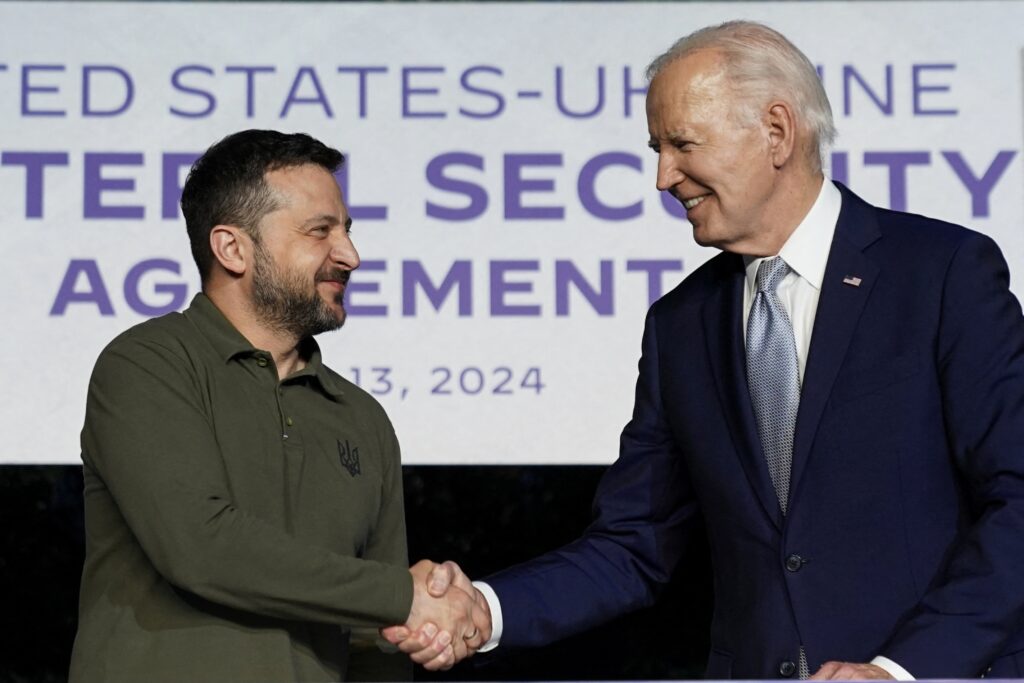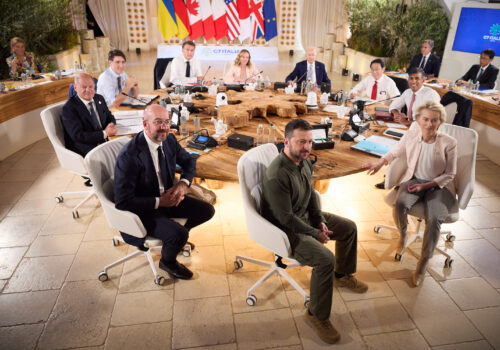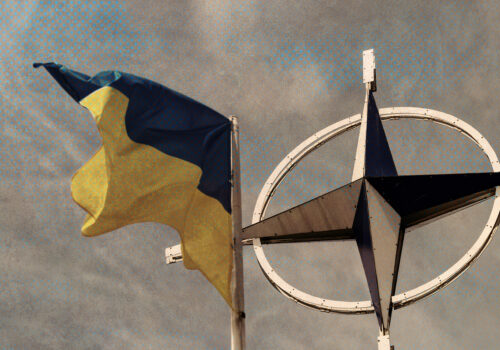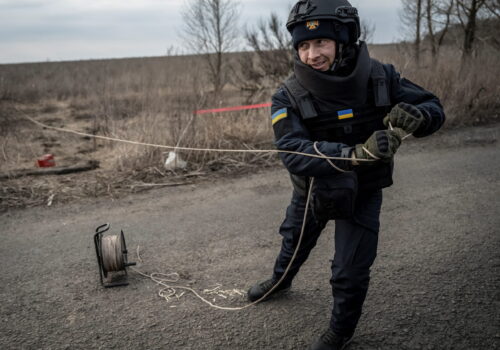
Ukraine’s fight against Russia gets three boosts from the G7

JUST IN
Uno, due, tre. As the Group of Seven (G7) summit kicked off Thursday in Apulia, Italy, US President Joe Biden presented three big steps to help Ukraine in its ongoing fight against Russian aggression. First, G7 leaders agreed to send Ukraine fifty billion dollars that will be paid for by future interest from blocked Russian assets. Second, Biden and Ukrainian President Volodymyr Zelenskyy signed a bilateral, ten-year security agreement. Third, a raft of new sanctions on Russia, unveiled Wednesday, are intended to further isolate Russia from the global financial system. Below, Atlantic Council experts dig into what these three steps mean and will do.
TODAY’S EXPERT REACTION COURTESY OF
- Charles Lichfield (@clichfield1): Deputy director and C. Boyden Gray senior fellow of the Atlantic Council’s GeoEconomics Center
- John E. Herbst (@JohnEdHerbst): Senior director of the Atlantic Council’s Eurasia Center and former US ambassador to Ukraine
- Ian Brzezinski (@IanBrzezinski): Senior fellow at the Atlantic Council’s Scowcroft Center for Strategy and Security and a former US deputy assistant secretary of defense for Europe and NATO policy
- Kimberly Donovan (@KDonovan_AC): Director of the Economic Statecraft Initiative within the GeoEconomics Center and a former US Treasury official
From Russia with interest
- On the immobilized Russian assets, considering that the G7 “was acrimoniously divided over what to do as recently as February, this is an extraordinary achievement,” says Charles, who has been at the forefront of research on this issue. Moreover, he adds, “we should appreciate how elegantly today’s compromise navigated the red lines of France, Germany, and other European Union member states,” all while providing a “game-changing amount.”
- The Kremlin is “fulminating that it will strike back by expropriating Western assets in Russia,” says John. “Maybe,” he adds, but that would cause more long-term headaches for Moscow as “Russia needs Western investment far more than Western investors need Russia.”
- John lauds the “superb work” of the Biden administration on this deal, but says that it should now push forward on a plan to confiscate all of the Russian assets, totaling nearly $300 billion, for Ukraine’s use. “While we should celebrate this day’s accomplishment, we must not rest on our laurels.”
- Charles, meanwhile, argues: “Let’s take the win and accept that confiscation remains off the table until a multilateral solution can be found.”
Subscribe to Fast Thinking email alerts
Sign up to receive rapid insight in your inbox from Atlantic Council experts on global events as they unfold.

-
-
This field is for validation purposes and should be left unchanged.
An indefinite ‘bridge’ to NATO?
- The new US-Ukraine security agreement has “much good in it,” says Ian. But within the mention of the bilateral deal being a “bridge to Ukraine’s eventual membership in the NATO alliance,” there are “extensive inferences that Ukraine is far from ready for NATO membership.” He adds, “Nothing is further from the truth. This has to be most disillusioning to Ukraine.”
- “To reverse this disillusionment and convince Ukraine that this bridge to NATO is not a route to indefinite delay, the Alliance must take tangible steps to integrate Ukraine into its operations and decision making,” says Ian.
- Specifically, Ian adds, that means detailing Ukrainian personnel to NATO headquarters and giving it observer status at the North Atlantic Council, just as Sweden and Finland had while their memberships were pending. He points out that Ukraine has much to share with the Alliance in this capacity: “No country has more experience and expertise to share when it comes to fighting Russia.”
Sanctions squeeze
- The US Treasury’s latest round of sanctions targeted critical aspects of Russia’s financial infrastructure and “is already having an effect,” says Kim, as Russia’s central bank and stock exchange halted trading in US dollars and euros.
- “The havoc created in Russia’s financial markets by this week’s new US sanctions is just the latest indicator of who has the whip hand in the economic relationship between Russia and the West,” says John.
- The US Treasury’s expansion of secondary sanctions from those dealing with Moscow’s military industrial base to the wide range of Russia-related sanctions is also notable, explains Kim. “This means that banks that are still transacting with sanctioned Russian entities in places such as China and India are exposed to the risk of secondary sanctions.”
- Furthermore, the US Treasury clarified that the foreign branches of designated Russian banks, such as VTB in China and India, are sanctioned. The Atlantic Council’s GeoEconomics Center called out this sanctions gap in the latest edition of the Russian Sanctions Database published in May, Kim notes. “This action should restrict how Chinese companies do business with Russia, but we’ll have to see, as much of the transactions occur in renminbi, not US dollars.”
Further reading
Thu, Jun 13, 2024
Experts react: Ukraine gets $50 billion from Russian assets and a US security deal at the G7 summit
Experts react By Atlantic Council experts
Our experts dig into the agreements reached at the G7 summit and how they might reshape Ukraine’s war against Russian aggression.
Mon, Jun 10, 2024
Building the bridge: How to inject credibility into NATO’s promise of membership for Ukraine
New Atlanticist By Ian Brzezinski
Ukraine’s bridge to NATO membership must be built in ways that institutionalize its integration into the Alliance’s structures—starting now.
Fri, Jun 7, 2024
Reconstructing Ukraine at war: The journey to prosperity starts now
Report By John E. Herbst, Olga Khakova, Charles Lichfield
Rebuilding the Ukrainian economy after Russia’s full-scale invasion will be a monumental task. Reconstruction can’t wait for peace and must be a well-coordinated, inclusive process.
Image: US President Joe Biden and Ukrainian President Volodymyr Zelenskyy shake hands on the day of signing a new security agreement between the United States and Ukraine, in Fasano, Italy, June 13, 2024. REUTERS/Kevin Lamarque




